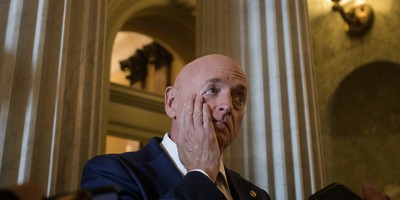WASHINGTON -- Lacking viable ideas on how to stimulate growth and jobs, the White House seems to be intent on killing both by raising tax rates on upper-income earners, investors and small businesses in a weak economy.
Over the weekend, President Obama and his advisers were still desperately peddling two invidious economic myths, namely that lower tax rates -- and not overspending -- produce budget deficits because they reduce government revenues, and, conversely, that higher taxes will not harm the economy.
But when tax rates were cut in the 1960s (under the Kennedy tax cuts) and in the 1980s (the Reagan tax cuts), the economy improved and as a result, overall federal tax revenues climbed.
The Kennedy tax cuts led to stronger economic growth and the higher revenues from that growth produced a budget surplus in 1969, despite forecasts that just the opposite would happen.
The Reagan tax cuts pulled the country out of the worst recession since the Great Depression with robust economic growth that at its peak, led to job creation numbers of more than 300,000 jobs per month. Deficits resulted in part because of the steep two-year recession that flattened tax receipts and Reagan's push to rebuild the military to defeat the "Evil Empire." But economic recovery and declining unemployment eventually pushed total government revenues to over $1 trillion for the first time in history.
Similarly, the 2001-2003 Bush tax cuts helped the U.S. economy recover after it went into a nosedive following the September 11 terrorist attacks. Federal spending rose in response to those attacks and a stepped up offensive against terrorism at home and abroad, among other things, pushed the deficit to $412 billion by 2004.
Recommended
But the economy grew as a result of tax cuts and the higher federal tax revenues from it as well as higher job growth helped drive down the deficit to $161 billion in 2007, the last budget produced by the Republican Congress. That same year, the Dow shot up to over 14,000 (just before the 2008-09 recession), and the jobless rate was a low 4.6 percent.
Now President Obama is trying to sell us on the idea that the best medicine for an anemic, high-unemployment economy is to raise taxes on the people who invest in it, pay the lion's share of all federal-income taxes, and run most of the nation's small businesses, which produce many of our jobs.
Obama never really explains how raising the two top income tax rates and other taxes on dividends, capital gains, investors and employers is supposed to improve our economy and create jobs.
His own advisers do not seem to have a clue about job creation and the critical need to boost capital formation and investment by cutting the capital gains rate. Treasury Secretary Timothy Geithner went on two Sunday talk shows to defend raising taxes at the end of this year, but said he would like to see less of Obama's public works spending and more unemployment benefits. He didn't have a lot to say about how to boost private investment, an economic issue that is still a major stumbling block.
But many if not most economists and virtually all of the nation's top business leaders say this is not the time to be raising taxes when so many sectors in our economy are struggling and the jobless rate is expected to remain near 10 percent for the rest of this year and next.
"If these growth-inhibiting tax increases occur -- about $75 billion in tax increases next year, $1.4 trillion over 10 years -- there will be serious economic damage," Stanford economist Michael J. Boskin writes in a recent Wall Street Journal op-ed.
If you don't believe him, how about Obama's own chief economic adviser, Christina Romer? In his column, Boskin points out that "In the most recent issue of the American Economic Review, Ms. Romer (and her husband David H. Romer) conclude that 'tax increases are highly contractionary ... tax cuts have very large and persistent positive output effects.'"
"Their estimates imply the tax increases would depress the GDP by roughly half the growth rate in this so-far anemic recovery," Boskin adds.
There's another big reason to stimulate economic growth and job creation through tax cuts rather than spending borrowed money that is only plunging us deeper into debt. Next to spending cuts, stronger economic growth remains the most efficient and sustainable way to slash the deficits.
The White House announced last week that under the president's borrow-and-spend fiscal policies, the federal deficit -- which reached a record $1.4 trillion last year -- will rise to nearly $1.5 trillion this year and again in 2011. And it will remain at or close to these trillion-dollar levels for the rest of this decade if we do not change course.
The result of all this: a high unemployment, a slow-growing economy, higher tax burdens on most Americans and record deficits as far as the eye can see. The voters will have a lot of issues to choose from when they go to the polls in November.

























Join the conversation as a VIP Member